Jon Brooks • • 19 min read
7 Popular “Self-Help Tips” That Are F**king Up Your Life

I’m appalled with some of the bullshit I see spouted by self-help speakers online.
Admittedly, I’m probably more irritated than the average person.
You see, it’s my full-time job to research the latest happenings in self-improvement and write about them.
I’m not complaining. It’s fulfilling work.
But I can’t lie when I say it comes with a major drawback.
For every great, well-researched idea I find, I have to first sift through fifty that are at best ineffective… and at worst… psychologically dangerous.
This article is my attempt to put things straight and alert you to some of negative sides of the so-called “positivity movement.”
Trigger warning: Many of the myths I dispel in this article may be a hard pill to swallow for those who are diehard fans of mainstream self-help. If you are one of these, my goal is not to upset you. Instead, I would like you to suspend your preconceptions about living the good life so you can soak in a refreshing perspective that may prove extremely useful and serve as a compliment to the ideas you already follow.
We need to make the distinction between “getting better” and “feeling better.” Most of the personal development information online is designed to make us feel better, to inflate our ego, but the problem is it rarely works the way it’s intended.
One has only so much time and energy, and to live a fulfilling life—free from regret—it’s vital that we spend our precious resources in the areas that will benefit us the most. And likewise, it’s bad enough that we punish ourselves for making mistakes, but far worse when we punish ourselves when the mistake was not even a mistake.
7 Popular “Self-Help Tips” That Are Fking Up Your Life
1) Learn how to become successful by listening to successful people.
The majority of self-help advice you hear today arrives to us through this two-step process:
1) A person achieves success in some area
2) That person then explains how they achieved that success
Our faith in the power of this formula has helped Tim Ferriss generate over a 100 million downloads1 for his podcast which aims to “deconstruct world-class performers” by interviewing them. Not to mention, hundreds of millions of books sales have resulted from the same intuition.
This idea seems so obvious as to be common sense.
If someone achieved success then of course they would be worth listening to, right?
Well, actually…
NO.
*Awkward silence*
Yep, I said it.
Let me illustrate my point. To do this, I will use none other than Arnold Schwarzenegger.
Arnie was the best bodybuilder in the world for many years, made millions in real estate before he was an actor, became the highest earning Hollywood actor, and then changed careers to become the Governor of California. He’s also appeared on The Tim Ferriss Podcast twice. By most definitions of success, he measures up.
All of this makes his Six Rules for Success speech utterly compelling.
Here is the short version:
- Trust yourself
- Break the rules
- Don’t be afraid of failure
- Ignore the naysayers
- Work your butt off
- Give back
Upon first read through, these rules for success sound exciting, inspirational, and reasonable.
So what’s the catch?
Well, those Six Rules for Success may just as well be titled Six Rules for Failure…
Because they’re also a wonderful recipe to help you fail.
Think about it.
How many well-meaning entrepreneurs trusted in themselves, broke the rules, and ignored the naysayers only to fail for exactly these reasons?
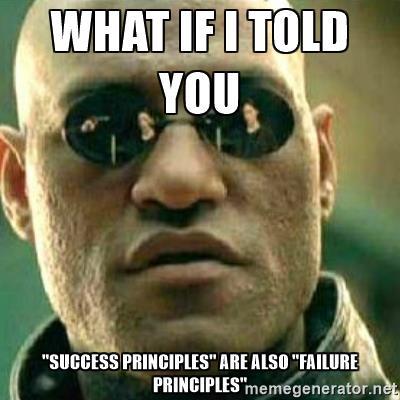
How many artists, intent on breaking the rules and ignoring criticism, suffered their entire lives in obscurity and poverty?
Derren Brown in his incredible book Happy writes that these types of self-improvement tips:
…are overwhelmingly the self-serving rationalizations of people who, upon becoming successful, now wish to feel that they have rightfully earned their status and the respect of others. So they look back over their journey and filter through it for evidence of their deservedness. The perpetual and overwhelming play of random chance is glossed over, and in its place a hero’s journey is invented. And very often that story is one of adhering to a vision, no matter what, and having no time for those who would get in the way or did not share the hero’s Herculean self-belief.
Before you were born, you won a sperm race to an egg. You won this race against roughly 250 million other sperms. Because you were the sperm that made it, and eventually ended up being born, do you think you could give good advice to other sperms who want to increase their chances of making it?
It’s a ridiculous question and a ridiculous scenario, but the point is not.
This question captures what psychologists call survivor bias. Simply put, survivor bias is the logical error of concentrating on the people or things that made it past some selection process and overlooking those that did not, typically because of their lack of visibility. This is also the bias we engage in when we listen to the advice of successful people.
From now on, whenever you look at “principles for success,” always ask the following three questions:
- How many people followed this advice and failed?
- How many people did not follow this advice and still succeeded?
- Is there a hidden variable behind the success principles that may be at work?
Did Arnold Schwarzenegger’s muscle building genetics, high extraversion and IQ, low neuroticism, and lucky breaks make him successful? Or was it simply a matter of following those six principles?
We will explore later in the article what kind of sensible strategies you can use to achieve success.
2) Go on a diet if you want to lose weight.
The opinion of most medical professionals today is that diets don’t work, are potentially dangerous, and should be avoided.
“Yeah but doctors don’t know nutrition! I’ve seen people lose weight on diets! Diets work!”
Okay, diets do will help people lose weight. There’s no arguing with that.
But statistics show 95% of people who lose weight2 by dieting will regain it all plus more within 1-5 years.
In other words, if you go on a diet, there is 95% chance you are going to be heavier in 1-5 years.
I understand this is demotivating, but it’s a fact.
How many people do you know who have lost weight only to regain it all back?
Tragic cases can be seen in shows like The Biggest Loser, where after radical weight loss most participants regain their weight.
But if you do need to lose weight, there is hope.
A diet is “a temporary and highly restrictive program of eating in order to lose weight.” That is the definition I’m referring to here.
The reason why the participants in The Biggest Loser regain their weight is because their dietary habits and psychological motivations on the show are not sustainable when they leave. They cannot do five hours of cardio each day, forever. The same phenomenon can be seen in some professional athletes after they retire.
If you really want to succeed in the weight loss game, there is no solution other than a drastic and permanent lifestyle change, with exercise and healthy eating becoming just a way of life.
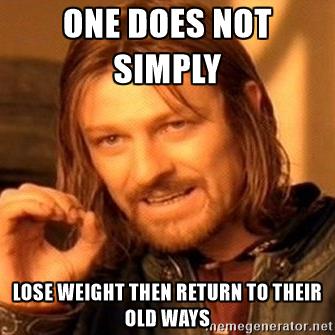
If you go on a diet, ask yourself: “Could I eat like this forever?”
If the answer is “no,” something needs to change.
3) Read self-improvement books to improve your life.
There is a thriving, passionate community of PUAs in the world.
A PUA is a pickup artist—a person trained in meeting and seducing women. I met a few of these guys when I was living in Amsterdam.
One would think that such a skill would be in high demand among single men, and yet most single men you meet have not attended a PUA seminar.
Why?
To study success with women, one must first admit one needs help with becoming more attractive. A thought too painful for many to bear, even if it contains some truth.
Interestingly, the psychology at work in the PUA community doesn’t seem to play as strong a role in self-help circles. Many people are proud to say that they’ve attended the latest Tony Robbins seminar.
This is probably down to the outstanding marketing efforts of those selling self-help products. They often assert that the very meaning of a successful life is to endlessly “grow” and “change” and the people who are not reading the latest self-help books are missing out and will end up as losers.
“Sure, but why is this a bad thing? People are going to be better off if they’re working on themselves and reading lots of self-improvement books.”
While that seems like it would be the case, in actuality reading lots of self-improvement books could be one of the most self-sabotaging activities you could do if you truly want to help yourself.
Let me introduce you to self-perception theory.
Self-perception asserts that people observe their own behavior and then conclude what attitudes and emotions must have caused it, which consequently links those attitudes with one’s identity. We smile and we conclude we are a happy person and consequently smile more. We don’t speak up and we conclude we are a shy person and consequently speak up less.
The theory is counterintuitive in nature because it proposes behavior determines attitude, not the other way around. If we see ourselves doing brave things, for example, we start seeing ourselves as someone who is brave. Most people who have loud voices are confident, but are they loud because they’re confident or confident because they’re loud. Self-perception theory would argue that they are confident because they are loud.
“Okay, interesting. But what does this have to do with reading self-help books?”
By reading lots of self-help books, on a deep psychological level we are reinforcing the idea that we need help.
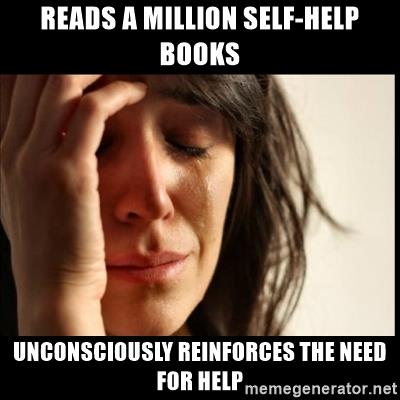
The personal development speaker Julian Blanc says in his video Want To Help Yourself? Give Up On “Self-Help”:
If you’re someone who’s working on becoming confident, what are you constantly reinforcing? That you’re not confident to begin with. If you’re someone who’s working on self-improvement, what are you constantly reinforcing? That you need to be improved.
“So does this mean you shouldn’t read self-improvement books or articles at all?”
I think it would be just as bad to tell someone to avoid reading self-help advice as it would be to read too much of it since that leads to black and white thinking. What I propose is that we change our relationship to the self-help genre. We can begin by only reading self-improvement as a means to an end and not an end in itself.
It’s all too common to for people to read self-improvement books because of the ego-driven high they get from imagining how awesome their life is going to be as they read. I want to argue that self-improvement books should be used as practical training manuals for living, and the art of living should be treated no different from the acquisition of any other skill.
“Being content is perhaps no less easy than playing the violin well: and requires no less practice.”
— Alain de Botton
The entrepreneur Gary Vaynerchuck was asked in his book #AskGaryVee if he had read any business books that influenced him. His response:
No. I have written four books, one about wine, and three about business. When I have written my eighth, I will have written more books than I have read. A lot of people think that one of my weaknesses is that I don’t read, and I waver between believing they’re right or they’re full of it. The truth is that I do read; I just don’t read the things other people like to read. I read up on baseball cards before selling them. I memorized the wine trades and used what I learned to help me sell on the floor of Wine Library, even before I could drink. I read in short, easily digestible formats about what interests me and what’s practice for me to know.
Gary Vaynerchuck has redefined self-improvement to fit his own needs.
Start with a simple problem you want to solve, then read up specifically on that problem. If you don’t have the basics of your life down such as good health, a good social life, a clean home, enough money to survive, and an intimate relationship, start figuring out these problems first. And when you do read personal development, read books that are written with evidence supporting them like these.
4) Avoid negative thinking at all costs.
One of the major aims of mainstream personal development is help people transform their “negative thoughts” into “positive thoughts.”
This makes sense.
We all want to be happier, so the more we can distance ourselves from the version of ourselves who thinks negative thoughts, the better… right?
Once again, the truth is be found in the opposite direction of this assumption.
Not only is negative thinking not bad, it’s one of the best things you can do to live a fulfilling live free from suffering.
“SAY WHAT?!”
The origins of modern-day self-improvement techniques trace back to the ideas found in Stoicism, an ancient Greek school of philosophy. Notable Stoics include Marcus Aurelius, Epicurus, and Seneca.
Stoic philosophers, from what we know of them, were quintessentially badass. Seneca, for example, was one of the wealthiest men in Rome. He lost and regained his wealth multiple times throughout his life, was exiled multiple times, tutored a psychopath emperor called Nero and was later sentenced to kill himself by him, which Seneca did with total tranquility.
The Roman Emperor Marcus Aurelius was arguably the last great Stoic. Ryan Holiday writes about him in The Obstacle is the Way as follows:
“The power he held never seemed to go to his head—neither did the stress or burden. He rarely rose to excess or anger, and never to hatred or bitterness… in Marcus we find a man who held the most powerful station in the world—and the universal verdict of the people around him was that he proved himself worthy of it.”
So what techniques did the Stoics employ to be such high-achievers physically, spiritually, and emotionally?
William B. Irvine, a philosophy professor and practicing Stoic, writes in his marvelous book on Stoicism A Guide to the Good Life that “the single most valuable technique in the Stoics’ psychological toolkit” was in fact a form of negative thinking.
Irvine elaborates:
They recommended that we spend time imagining that we have lost the things we value—that our wife has left us, our car was stolen, or we lost our job. Doing this, the Stoics thought, will make us value our wife, our car, and our job more than we otherwise would. This technique—let us refer to it as negative visualization—was employed by the Stoics at least as far back as Chrysippus.
Today negative visualization techniques are used by cognitive therapists as powerful interventions for anxiety and depression. Cognitive flooding, for example, helps you overcome your anxiety by getting you to visualize your worst fear with as much detail as possible. Anxiety is a flame that lasts only so long, by consciously inducing it we can make it disappear.
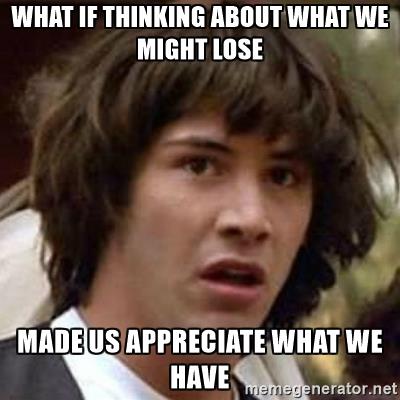
It doesn’t stop there.
Negative thinking can also help you achieve your goals. Gabriele Oettingen and Thomas Waden from the University of Pennsylvania tracked a group of obese women taking part in a weight loss program.
During the program, each overweight participant was asked to fantasize about four hypothetical situations. Two about themselves losing weight and two about tempting food related scenarios they might find themselves. The researchers measured their answers on a positivity scale.
Contradictory to what most might assume, those with the negative fantasies had lost on average 12 kilos more than those with positive fantasies.
Researchers postulate that the reason for this is because people who fantasize about how great the future may be, are poorly equipped to handle the inevitable setbacks and give up at the first hurdle.
Please note that negative visualization is not the same as absentminded worrying. Negative visualization is the conscious choice to contemplate obstacles, setbacks, and potential losses. If you want to practice it, start with trivial annoyances and gradually build up to more frightening or saddening scenarios.
5) Don’t procrastinate.
If you read the Leonardo da Vinci wikipedia page you will see a glaring incongruence. The first paragraph shows us the Leonardo we are familiar with:
“Leonardo da Vinci was an Italian Renaissance polymath: painter, sculptor, architect, musician, mathematician, engineer, inventor, anatomist, geologist, cartographer, botanist, and writer. His genius, perhaps more than that of any other figure, epitomized the Renaissance humanist ideal.”
But in the following paragraph:
“Perhaps fifteen of his paintings survive, the small number because of his constant, and frequently disastrous, experimentation with new techniques and his chronic procrastination.”
Leonardo da Vinci was a chronic procrastinator…
But was he the superhuman we think of him now in spite of his procrastination or because of it? I strongly suspect the latter is true.
Rarely when you procrastinate do you do nothing. I bet you get a lot of stuff done—just not the stuff you intended to do.
John Perry, a philosopher at Stanford calls this phenomenon “structured procrastination.” Dr. Perry was your typical self-loathing procrastinator until one day it occurred to him that he wasn’t being lazy. When Perry procrastinated on grading his students’ work, he would instead play Ping-Pong with students or work on his book.
The well known computer scientist Paul Graham writes, “The most impressive people I know are all terrible procrastinators.” He then explains that procrastination is not something that we can ever really cure because there are an infinite amount of things we could be doing at any given time. We will always procrastinate, and so instead of learning how not to procrastinate, we should learn how to procrastinate well. According to Graham, “Good procrastination is avoiding errands to do real work.”
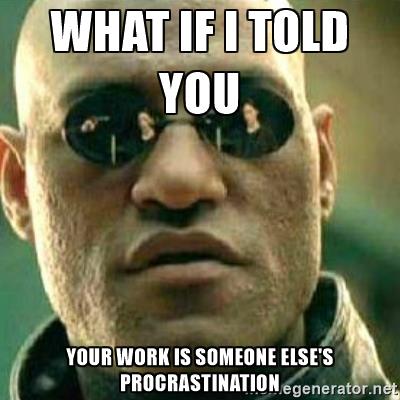
One can imagine Leonardo procrastinating on his commissioned art pieces to spend his days dreaming up revolutionary inventions or exploring nature with notebook in hand.
“Men of lofty genius when they are doing the least work are most active.”
— Leonardo da Vinci
Constantly putting off important tasks that need to be done is not a sign of creative genius, it’s a sign of emotional weakness. In life, there are times when we just gotta grind through our to-do list and skip marathon Netflix watching.
But the point I want to make is that procrastination is not always bad and should not always be avoided. Many of the greatest “aha moments” came to people when they were not rigidly focusing on their work.
There is such a thing as bad procrastination, but procrastination isn’t always bad.
6) Follow your passion.
Go to any career adviser for help finding a job and you will be get asked the following question:
“What are you passionate about?”
We live in a society where it is both the starting point and the end goal for us to do work we feel “passionate” about.
So what’s the issue?
Well, there’s no problem in having a job about which you feel passionate—that’s a wonderful and worthwhile goal—the problem is how we are told to achieve it, which invariably comes in the neatly packaged slogan: “Follow your passion.”
According to Cal Newport in his book So Good They Can’t Ignore You, “‘Follow your passion’ might just be terrible advice.” Newport argues that if you look at the lives of the people who are actually passionate about what they do, they did not get there simply by following their passions.
Steve Jobs, for example, a year before he started Apple went off in India on a spiritual quest. He even considered becoming a monk. According to his authorized biography, Jobs only founded Apple because he was knowledgable about electronics, full of ideas, a great salesman, and happened to be in the right place at the right time to meet Steve Wozniak—a tech whizkid. Steve Jobs did not found Apple because he always had a dream of starting computer company.
The best way to find work that you are passionate about is to do work you are good at. When you are talented at something and you find work that brings out your natural strengths, you are much more likely to develop passion in that area.
I know that my strengths, for example, consist in lateral problem solving and creative thinking. That is what I’m good at, and if I find work that brings out those strengths in me I am likely to be passionate—regardless of the specific job type.
So if you want to find work you are passionate about, don’t follow your passion. Figure out what you’re good at, then put all your energy into developing your talents further and finding work that enables you offer your talent to the world.
To add to this point, personality psychologist Jordan Peterson offers some great advice in his fantastic lecture The Curse of Creativity:
Whenever I talk to people who are creative, and you should listen to this because I know what I’m talking about. If you happen to be creative—you’re a songwriter, another kind of musician, or an artist, or any number of the other things you might be, find a way to make money. And then practice your craft on the side [my highlight]. Because you will starve to death otherwise. Now for some of you that won’t be true, but that’s a tiny minority. Your best bet is to find a job that will keep body and soul together and parse off some time so you can pursue your creative thing.

7) Let out your feelings.
That idea that we ought to always “express our emotions” has been gaining popularity in recent years.
Bottling up our feelings, we are told, will make us repress parts of ourselves that will come out later in extremely destructive ways.
Steven Briers in his highly-readble book Psychobabble: Exploding the Myths of the Self-Help Generation reveals things are not so simple:
…even here in the Western world there is emerging evidence that letting it all out isn’t necessarily the best strategy for everyone. After the tragic destruction of the World Trade Center on 11 September 2001, a team from the University of Buffalo emailed over 2,000 people that same day, asking them to share their thoughts in writing about the events of 9/11. Three-quarters of the people surveyed wrote a response, while the remaining quarter ignored the request. Over the next two years the Buffalo team regularly contacted everyone in the sample, screening them for signs of emotional distress and physical problems. What they discovered ran counter to what we are conditioned to expect. Those who had not responded to the initial request to share their feelings actually did better than those who had written their emotions down, and in fact those who wrote the most also proved to be the most vulnerable to unwanted psychological and physical symptoms.
And there is plenty more research like that.
Psychiatrist Sally Satel and the philosopher Christina Hoff Sommers, in their book One Nation Under Therapy: How the Helping Culture is Eroding Self-Reliance, set out to challenge certain aspects of modern psychological therapy.
In the book, they write:
Recent findings suggest that reticence and suppression of feelings, far from compromising one’s psychological well-being, can be healthy and adaptive. For many temperaments, an excessive focus on introspection and self-disclosure is depressing. Victims of loss and tragedy differ widely in their reactions: Some benefit from therapeutic intervention; most do not and should not be coerced by mental health professional into emotionally correct responses. Trauma and grief counselors have erred massively in this direction.
“Even if this is true, I don’t want to be fake with my emotions.”
One could argue that even if not freely expressing one’s emotions is psychologically beneficial, it could leave us feeling as though we’re being inauthentic—which carries its own set of social drawbacks.
That’s a reasonable-sounding argument, but it’s founded on the false assumption that our feelings arise spontaneously within us and therefore represent the truth about us.
Arlie Hochschild, a Professor of Sociology at Berkeley, claims that the spontaneity of our feelings is an illusion. Her research shows that people tend to regulate their emotions based on “feeling rules,” which tell us what emotions we should feel, for how long we should feel them, and to what intensity they should be. Different cultures and countries have different feeling rules and they are to a large extent alterable.
“Okay, fair enough. But what about catharsis? Isn’t it healthy to talk about trauma so we release it?”
While it is true that people who talk about traumatic events tend to recover better than those who don’t, it’s important to distinguish between the different forms of expression. Dr. James W. Pennebaker, a social psychologist who’s done extensive work on the link between expressive writing and its positive effects on dealing with trauma, in a podcast interview with Jordan Peterson, explains what catharsis actually is:
Most people listening to this podcast will hear catharsis and they will think that catharsis means blowing off steam or venting. And that’s not what Freud actually meant… Freud and the Europeans view catharsis as connecting emotions and thoughts… We had found that people who just blew off steam—who just expressed emotions—actually didn’t show any health improvements.
Does this mean you should keep all of your feelings bottled up inside?
No, of course not.
As with most of the “bad advice” in this article, it’s usually just good advice gone wrong. Owning and acknowledging your feelings is an extremely important part of maintaining emotional health. But there is a huge difference between taking ownership of our feelings and desperately trying to vent them to anyone in earshot as if you’re the biggest victim in the the world.
Conclusion: 7 “Self-Help Tips” That Will Help You Live Your Best Life
Bullshit and lies are not always the exact opposite of truth. Sometimes if a truth is spoken with a malevolent intention, with an agenda, it can become a subtle lie that seems true, but is off the mark enough to be harmful.
To conclude, I will list the alternative, non-bullshit versions of the self-improvement advice in this article:
1) To be “successful” you must have copious amounts of luck, talent, and energy. The best strategy for success is not to just listen to successful people, but to put your energy into mastering a particular craft. That’s within your control. How famous or rich you become is not.
2) To lose weight, learn everything you can about it. Read books on various diets, keep an open mind, join a gym, track your progress, surround yourself with other health-orientated people, change the contents of your fridge, and create a lifestyle that you can stick to forever so you don’t fall back into old behavioral patterns.
3) To improve your life with books, don’t read for ego gratification. Instead, read as if you have a problem that needs solving. Apply the lessons contained in the books immediately in your life. It is better to read five self-improvement books that you internalize and act through in daily life, than to read a hundred that make you sound like you have your life together.
4) Actively engage in negative visualization. Spend a few minutes contemplating the annoyances or tragedies of life each day, but finish by acknowledging all of the great things you currently have. This will prepare you for the suffering inherent in life while keeping your heart open enough to receive its most dazzling jewels.
5) To be productive, realize that you cannot ever avoid procrastination. When you are procrastinating, think of it as a message from a higher power teaching you something about yourself and your path. If you procrastinate frequently, make sure it’s the good form of procrastination—that means you are still learning or being productive in some area of your life even if you aren’t doing the thing on the top of your to-do list.
6) To find work you’re passionate about, don’t follow your passion. First of all make enough money so you can sustain your life. When you have that, figure out what you’re naturally good at, then put all your energy into getting even better at it. See where you end up.
7) When things get tough don’t just vent and express your feelings. Own them, contemplate them, write about them, and discuss them with other people you respect to try and uncover patterns and meaning.
If you found the information in this article interesting and valuable, please share it on social media.
- http://tim.blog/podcast/ ↩︎
- These statistics are likely skewed because they only studied hard case dieters. Real number is probably closer to 70%. ↩︎

Jon Brooks
Jon Brooks is a Stoicism teacher and, crucially, practitioner. His Stoic meditations have accumulated thousands of listens, and he has created his own Stoic training program for modern-day Stoics.










